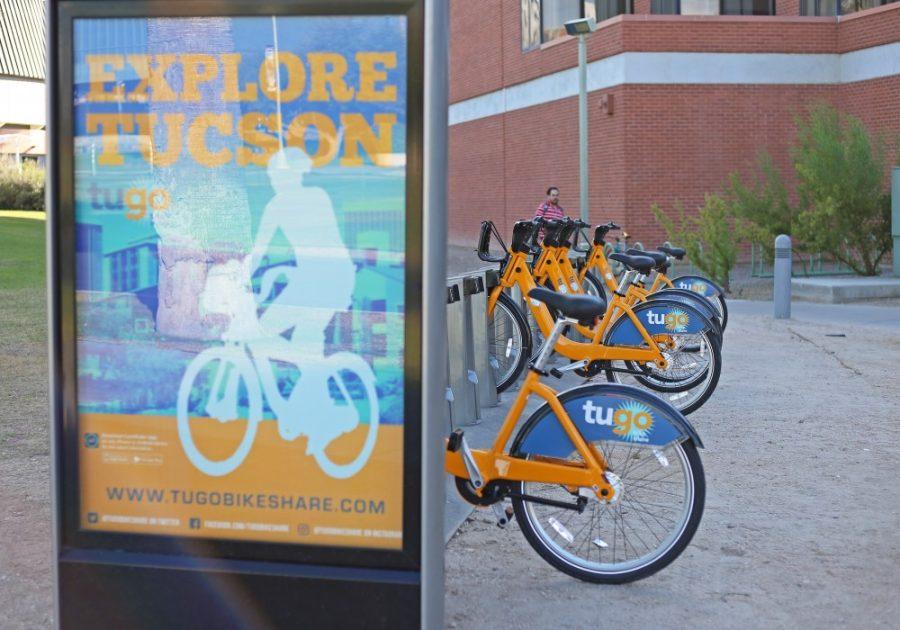After years of being in development, the City of Tucson’s new bike share program, Tugo, finally began November 17, 2017.
“I encourage people to use it,” said Steve Kozachik, Ward 6 Tucson City Council member. Kozachik, who tested the new program out for himself at a ribbon cutting ceremony that was held at McKale Center. “Getting people out of their cars and onto bikes is healthier”
Bike share is a newer form of transportation where users are able to go to a self-service station to rent a bike. The bikes are commonly used for short trips around a city or for short trips combined with transit transportation.
Bike share programs are being implemented worldwide with hundreds of bike share systems in use.
“As bike share started to grow in popularity we were starting to look at whether or not it could help Tucson with increasing the visibility of cycling,” said Ann Chanecka, former Bicycle and Pedestrian Program Coordinator for the city of Tucson.
RELATED: Tucson biking community enjoys Cyclovia’s new South Tucson route
The Tucson bike share program launched with roughly 36 bike share stations and 330 bicycles kept in solar powered docks all placed in and around midtown Tucson. The self-service stations will be open for use 24/7 every day of the year.
Workers at the Tucson Department of Transportation suspected a bike share program would be good for Tucson, said Chanecka.
The next steps were to hire workers who already had experience implementing a bike share program and to figure out whether Tucson could support the program. Once experienced workers were found, a Bike Share Feasibility Study and Implementation Plan was completed.
The Bike Share Feasibility Study looked at aspects of Tucson such as the ridership, weather conditions, topography, destinations and bike friendliness.
“They looked at several different land-use characteristics to evaluate whether or not Tucson could support a bike share system, and if so, where the station locations made the most sense,” Chanecka said. She also said that the student population in Tucson was a big advantage for the program.
Tucson was found to meet the requirements for a bike share system to be implemented, but the process, beginning in 2013, was not the easiest. The lack of familiarity with bike share among Tucsonans caused skepticism towards it, turning it into “a very political project,” said Chanecka.
Finding the funding for the project and getting Tucsonans to understand it have been the other main challenges.
The primary funding for the project is a federal grant, the Transportation Alternative Program Grant, and cannot be used to pay a police officer or to “fill a pothole,” said Chanecka who admitted that Tucson’s “huge budget deficit” the city is a “unique challenge.”
“There’s also this image of, well, the city is talking about layoffs and can’t balance the budget and now we’re introducing bicycles, and so to some it may be confusing,” Chanecka said.
The costs for the program up to until launch are supposed to be covered by the grant, and additional funding for operations and maintenance costs are planned to be covered by user fees, sponsorships and advertising.
For the Tucsonans who are worried about these costs putting any type of burden on Tucson, “there will not be any financial risk for the city,” Chanecka said.
During the programs initial launch, bike share systems are to be centered around midtown, but ideally more stations will be added later in other areas of Tucson. Cities that already have bike share, such as Phoenix, started out with a similar plan and later expanded throughout the city.
“We’re hopeful that we’ll both be able to increase the density of the system and expand its geography,” Chanecka said.
RELATED: Cycling classes can provide health benefits
The prices for users generally vary from $8 for a daily pass, $18 for a monthly pass, and $80 for an annual pass. Each pass grants the rider with an unlimited number of 30-minute trips for either the day, month, or year, depending on which pass you purchase.
For the daily pass, if a rider needs to make a trip that is longer than 30 minutes, users will pay $4 extra for each additional 30-minute period. For monthly and annual passes, users will pay $2 extra for each additional 30-minute period.
The bike share system is planned to improve the community in many ways such as making Tucson more financially sustainable, making bicycling easier and more visible, improving economic development, attracting tourists and helping to supplement transit use.
“It’s hard to explain those [improvements] until people see it in action,” Chanecka said, and by the end of the year maybe Tucson will begin to.
Follow the Daily Wildcat on Twitter









